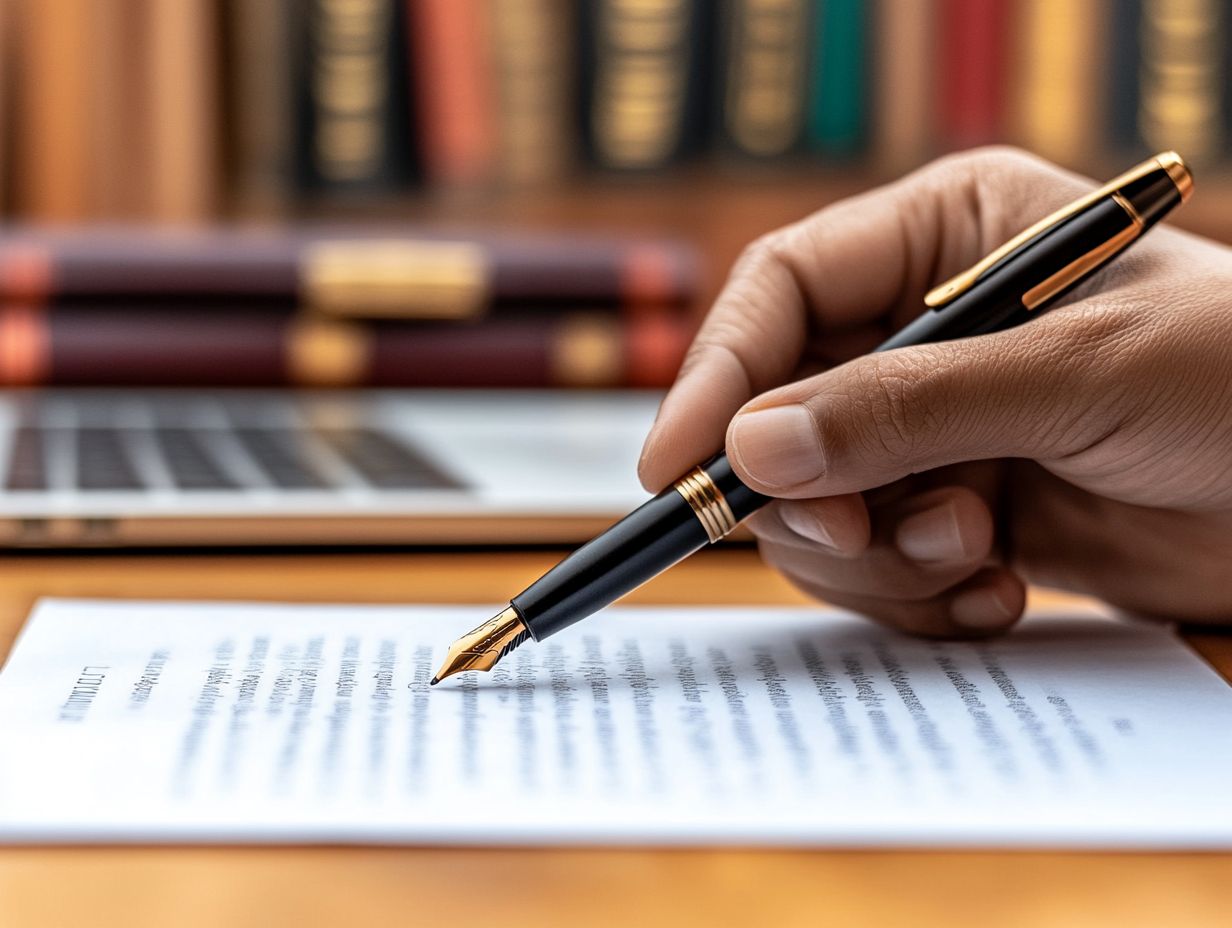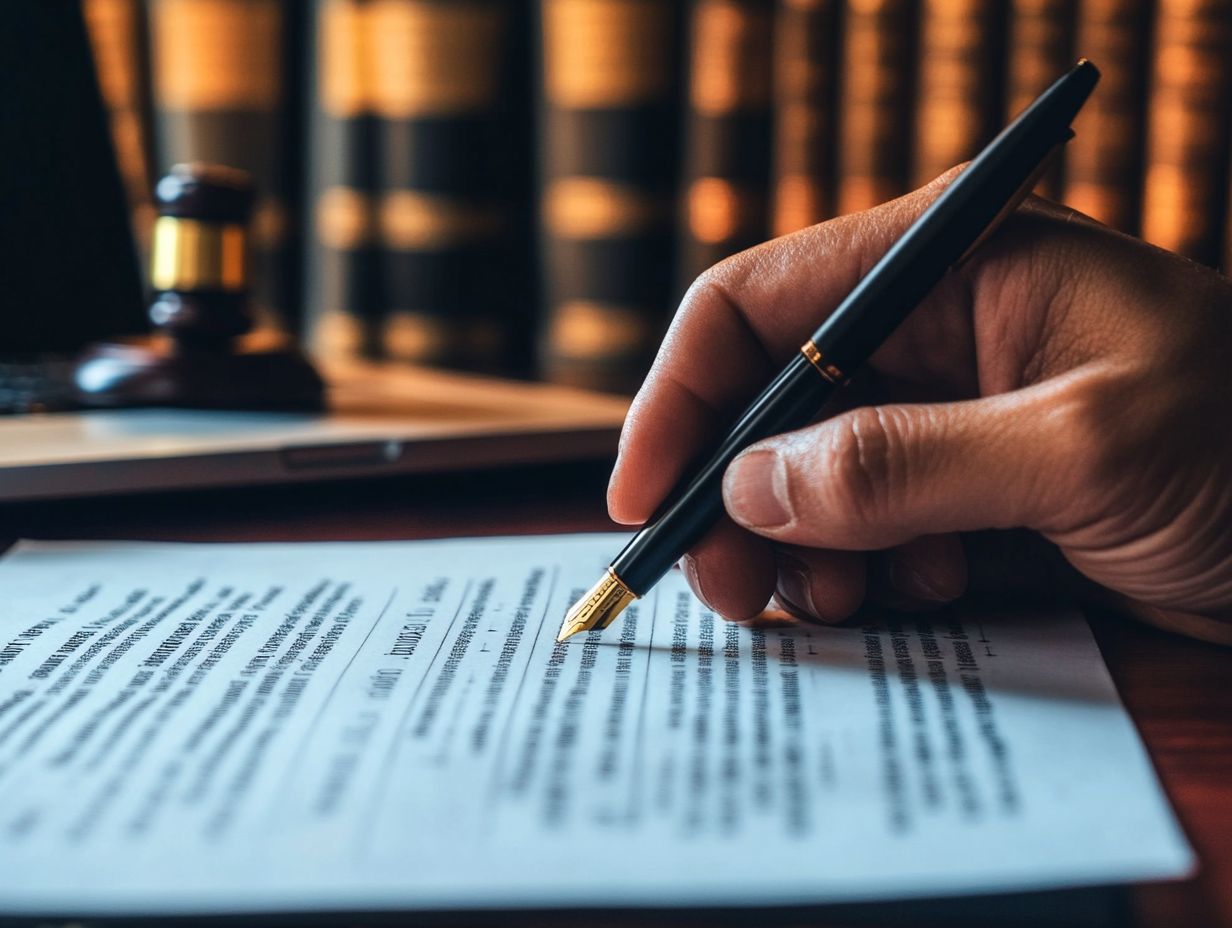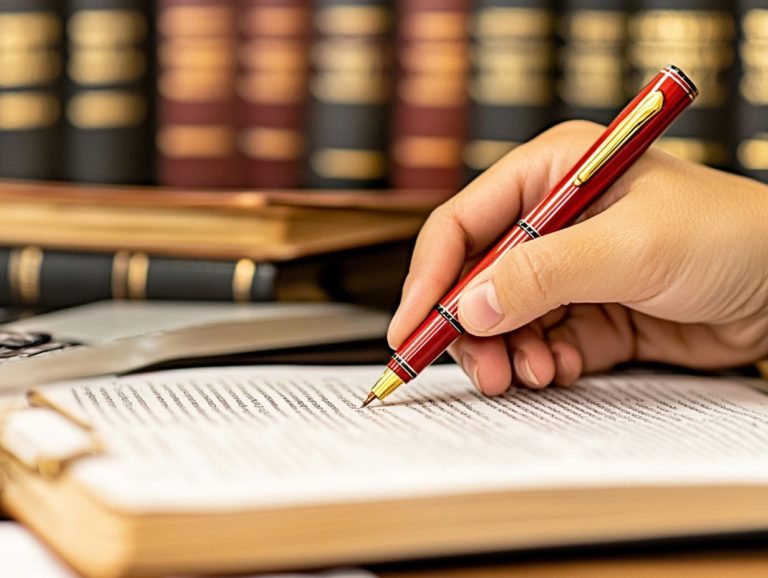How to Protect Your Rights in a Licensing Agreement
Licensing agreements are essential in numerous industries, empowering you to leverage creative works or inventions that you own while safeguarding your rights.
Let s explore the essentials of licensing agreements together! This article delves into the intricacies of these agreements, identifying key elements and important terms that you should be aware of. It also discusses how to negotiate favorable terms that effectively protect your interests.
You ll discover common pitfalls to avoid and the legal options available in case of breaches. Whether you re an IP owner or a licensee, grasping these concepts is crucial for crafting successful and secure agreements.
Contents
- Key Takeaways:
- Understanding Licensing Agreements
- Key Elements of a Licensing Agreement
- Protecting Your Rights in a Licensing Agreement
- Enforcing Your Rights
- Common Pitfalls in Licensing Agreements
- Frequently Asked Questions
- What is a licensing agreement and why do I need to protect my rights in it?
- How can I protect my rights in a licensing agreement?
- What should I consider before entering into a licensing agreement?
- What are some common mistakes to avoid when entering into a licensing agreement?
- What are my options if my rights are violated in a licensing agreement?
- What can I do to ensure a successful and fair licensing agreement?
Key Takeaways:
- Negotiate favorable terms to protect your rights.
- Proper documentation is essential.
- Avoid common pitfalls in licensing agreements.

Understanding Licensing Agreements
Grasping the intricacies of licensing agreements is vital for any business that seeks to innovate while safeguarding its IP assets. These legal contracts dictate a range of licenses, including exclusive, non-exclusive, and sole licenses, outlining how your IP assets such as patents, trademarks, and copyrights can be utilized.
A solid understanding of these terms equips you to navigate the complex realm of licensing, ultimately paving the way for increased profits, new revenue streams, and opportunities for market expansion.
What is a Licensing Agreement?
A licensing agreement is a legally binding contract that grants you permission from the person or company giving you permission to use their IP to utilize specific intellectual property assets, all under clearly defined terms and conditions.
These agreements are vital for businesses, as they protect the rights associated with IP. They ensure that your creative works, inventions, or proprietary technologies are safeguarded against exploitation without your consent.
Legal professionals, particularly business lawyers, stress the importance of precision and clarity in these documents. Ambiguous language can quickly lead to disputes and misunderstandings, which is the last thing you want.
By clearly outlining the scope of use, payment terms, and duration, both you and the other party can establish a harmonious relationship. This protects the integrity of the IP assets involved and fosters an environment that encourages innovation and growth.
Key Elements of a Licensing Agreement
The key elements of a licensing agreement encompass vital components, including financial terms, the scope of use, territory limitations, and specific licensing clauses that clearly outline the rights and responsibilities of the parties involved.
Each of these elements plays a crucial role in ensuring that the agreement is comprehensive and enforceable, ultimately protecting the interests of everyone concerned.
Important Terms and Conditions
Important terms and conditions in a licensing agreement include legal terms, compliance standards, and termination conditions that ensure you fully grasp your rights and obligations alongside the other party.
Such agreements typically detail critical elements like intellectual property rights, clearly outlining what is permissible under the licensed use. They establish compliance guidelines that you must follow, ensuring that you don t infringe on the licensor’s rights or run afoul of relevant laws.
The termination clauses also provide essential stipulations regarding how either party can exit the agreement, specifying necessary notice periods and valid grounds for termination.
By maintaining clarity on these elements, you can significantly enhance the relationship between the parties involved and reduce the likelihood of disputes, ultimately fostering a smoother operational flow.
Protecting Your Rights in a Licensing Agreement

Protecting your rights in a licensing agreement requires a thorough understanding of the negotiation process. It’s essential to establish confidentiality agreements that safeguard your interests and to be prepared for potential legal action should disputes or breaches arise. Additionally, knowing how to stay compliant with licensing agreements can further strengthen your position.
Navigating this landscape skillfully ensures your rights remain intact and your agreements serve your best interests.
Negotiating Favorable Terms
Negotiating favorable terms in a licensing agreement requires experienced lawyers who advocate for your rights as a licensee while ensuring that the licensor’s responsibilities are clearly outlined. It’s also crucial to know how to spot unfavorable terms in licensing agreements.
These legal experts guide you through the nuanced negotiation process, honing in on expectations and deliverables while minimizing potential misunderstandings.
Understanding this balance is essential for your success! You must grasp your objectives as a licensee and the obligations the licensor must fulfill. Lawyers foster open communication, asking insightful questions to uncover any concerns and identify areas ripe for compromise.
By clearly defining the scope of rights granted and responsibilities undertaken, these negotiations strive to cultivate a win-win scenario, nurturing a cooperative relationship that benefits both parties in the long run.
Ensuring Proper Documentation
Ensuring proper documentation in licensing agreements is crucial for effective contract management and compliance adherence, helping you prevent future disputes.
This involves more than just the initial drafting; it requires utilizing robust templates that promote consistency and clarity throughout the process.
By maintaining meticulous records of all licensing activities, you can significantly reduce risks associated with misunderstandings or breaches of contract.
Regularly reviewing these agreements is wise to ensure they align with current legal requirements and industry best practices.
Comprehensive documentation not only serves as a valuable resource during audits but also enables you to demonstrate compliance with relevant regulations and standards. Ultimately, this fosters stronger relationships among all parties involved.
Enforcing Your Rights
Enforcing your rights within a licensing agreement requires a thorough understanding of trademark licensing agreements and your legal options should a breach occur.
This includes exploring various dispute resolution methods like mediation and arbitration, and the possibility of pursuing legal action if necessary. Being well-informed enables you to navigate any challenges effectively.
Legal Options for Breach of Agreement
For breaches of licensing agreements, you have several pathways available, ranging from mediation to litigation. Each method is designed to help you resolve disputes effectively.
Mediation encourages open communication and often leads to quicker resolutions, but it lacks binding power if one party is reluctant to adhere to the agreement reached.
Litigation provides definitive enforcement of legal rights but can be mired in lengthy processes and substantial costs. Arbitration offers a balanced alternative it’s generally faster than litigation while still maintaining a level of formality that lends legal weight to the proceedings.
Given these complexities, consulting comprehensive legal advice is essential for you to navigate your options wisely, ensuring you select the most appropriate path for your specific situation.
Common Pitfalls in Licensing Agreements

In licensing agreements, common pitfalls often arise from misunderstandings regarding contract breaches, a lack of adherence to compliance standards, and insufficient dispute resolution mechanisms.
These issues can escalate into significant legal disputes, potentially jeopardizing your interests and investments.
Mistakes to Avoid
Avoid these common mistakes to protect your interests! In licensing agreements, inadequate contract management practices, neglecting legal action options, and failing to articulate key terms with precision can lead to significant disputes. To better navigate these challenges, consider learning how to use licensing agreements for product development.
Such oversights jeopardize your financial stability and strain professional relationships. A misunderstanding of the intellectual property landscape might result in unintentional infringement, while a failure to define the scope of usage can create confusion.
As you engage in negotiations, approach the process with thorough preparation. Ensure that terms are clearly articulated, assess potential risks, and establish a mutual understanding of rights and obligations for both parties.
Ultimately, fostering open communication will help mitigate potential pitfalls and enhance the success of your licensing agreements.
Best Practices for Protecting Your Rights
Implementing best practices for protecting your rights in licensing agreements involves a few key strategies, including resolving disputes in licensing agreements.
- Establish clear confidentiality agreements,
- Talk openly and make sure everyone agrees,
- Keep detailed records.
These elements come together to form a strong foundation for safeguarding your intellectual property. They ensure that everyone involved understands their responsibilities and obligations.
By taking the time to define your confidentiality agreements, you can effectively minimize the risk of information leakage. Effective negotiation sets the stage for mutually beneficial terms and creates a collaborative atmosphere where concerns can be openly addressed.
Keeping thorough records of all communications and agreements allows you to refer back to essential documents. This provides clarity and enhances trust throughout the partnership.
Frequently Asked Questions
What is a licensing agreement and why do I need to protect my rights in it?
A licensing agreement is a legally binding contract between a licensor and a licensee. It grants the licensee the right to use the licensor’s intellectual property, like trademarks, patents, or copyrighted material. Protecting your rights in a licensing agreement ensures your intellectual property is not used without your permission and that you receive proper compensation.
How can I protect my rights in a licensing agreement?

To protect your rights, clearly define the terms and conditions of the agreement. Outline the permissible use of your intellectual property, the duration of the agreement, and the compensation you will receive. It’s also essential to include provisions to monitor and enforce the agreement, as discussed in understanding the implications of licensing agreements, to prevent infringement.
What should I consider before entering into a licensing agreement?
Before entering into a licensing agreement, carefully review and understand the terms. Grasp the scope of the agreement, the potential risks and benefits, and what should be included in a licensing agreement to protect your interests. Consulting with an attorney who specializes in intellectual property law can help ensure your rights are adequately protected.
What are some common mistakes to avoid when entering into a licensing agreement?
A common mistake is not clearly defining the terms of the agreement. This can lead to misunderstandings and disputes later. To avoid this, thoroughly research the licensee and their track record, and negotiate fair compensation for the use of your intellectual property. For more detailed information, refer to the comprehensive guide on understanding licensing agreements. Additionally, regularly review and update the agreement to meet your needs and protect your rights.
What are my options if my rights are violated in a licensing agreement?
If your rights are violated, you may have legal options. You can seek damages for losses, terminate the agreement, or take legal action to enforce its terms. Consult an attorney for advice on the best course of action to protect your rights and seek compensation.
What can I do to ensure a successful and fair licensing agreement?
To ensure a successful and fair licensing agreement, thoroughly review and negotiate the terms. Understand the scope of the agreement, the compensation offered, and any provisions for monitoring and enforcement. Consulting a lawyer can help you understand your rights and navigate the legal implications of licensing agreements effectively on your behalf.





